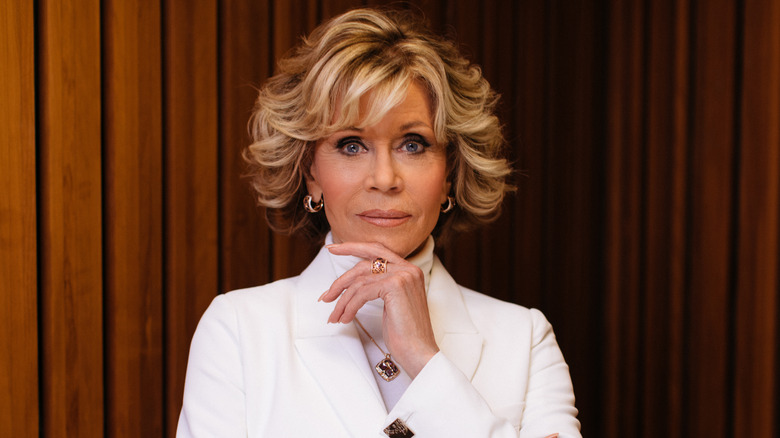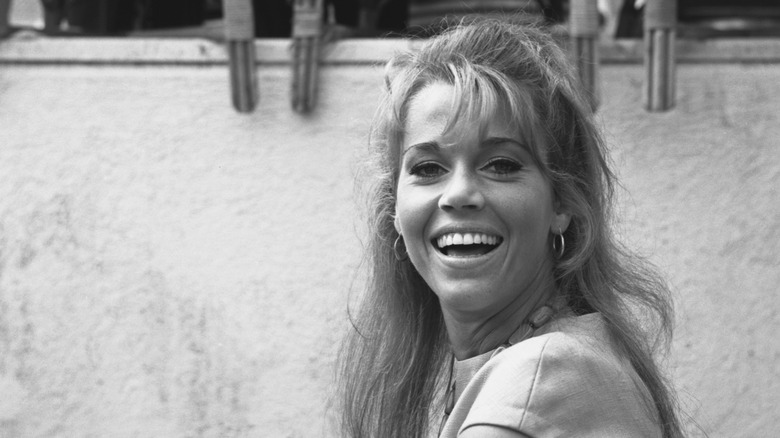Why Jane Fonda Isn't Proud Of Getting Plastic Surgery
Jane Fonda is living proof that age is nothing but a number. Now in her 80s, the iconic actor and activist continues to draw attention at award shows for opting to rock elegant gowns that highlight her silhouette, Town & Country noted. Fonda has also broken barriers by playing meaningful roles as an older woman in an industry that notoriously ditches female actors around age 40, as The Washington Post noted. In their late 70s, Fonda and Lily Tomlin brought the lives of older divorced women to the homes of people everywhere by means of Netflix's "Grace and Frankie" — with great success. In 2021, after seven seasons, "Grace and Frankie" continues to rank among Netflix's most popular series, according to HuffPost.
"Grace and Frankie" shows there is interest in the lives of mature women. "A lot of older women say to me and to Lily, 'You know, you gave me hope. I can now see that there could be a future,'" Fonda told Vogue. The medium also matters here, with Fonda citing it as a reason she wanted to try TV. "I have long wanted to give a cultural face to old age. And it's hard for older women to do that, in particular in major feature films these days. Maybe always," Fonda added.
Using her incredible looks to put the spotlight on older women has proved successful. But that's not to say Fonda hasn't struggled with the pressure to look good and look young, with lasting health consequences.
Jane Fonda struggles with her self-image
Jane Fonda knows she looks fantastic, but she also knows she went to extreme measures to ensure she did. Speaking with W magazine in 2011, Fonda said she is "not proud" of having had cosmetic procedures. On HBO's "Jane Fonda in Five Acts" (via People), Fonda spoke candidly about having plastic surgery on her eyes and jawline, citing it as part of the reason "I look good for my age." Fonda doesn't exactly regret going under the knife, but she wishes she hadn't felt that she needed it. "I hate the fact that I've had the need to alter myself physically to feel that I'm OK. I wish I wasn't like that," Fonda said.
In 2020, Fonda told Elle Canada that she was ready to stop fighting time and her age. "I can't pretend that I'm not vain, but there isn't going to be any more plastic surgery — I'm not going to cut myself up anymore. I have to work every day to be self-accepting; it doesn't come easy to me," she admitted. In 2011, Fonda told Harper's Bazaar that her insecurities hail from her childhood. "I was raised in the '50s. I was taught by my father that how I looked was all that mattered, frankly. He was a good man ... but he sent messages to me that fathers should not send: Unless you look perfect, you're not going to be loved," she said of her father, the late actor Henry Fonda.
Jane Fonda struggled with an eating disorder
Jane Fonda struggled with poor self-image for decades. Those issues led to a harmful illness: bulimia. In 2011, Fonda told Harper's Bazaar that she lived with the eating disorder most of her life. "It was in my 40s, and if you suffer from bulimia, the older you get, the worse it gets. It takes longer to recover from a bout. I had a career, I was winning awards, I was supporting nonprofits, I had a family," she said. It was only then that she decided she had to put her health first. "I had to make a choice: I live or I die."
Her life took a turn for the best around that time and she finally began to come to terms with her own body. "I wasn't very happy from, I would say, puberty to 50? It took me a long time," she told Harper's Bazaar. Amid her recovery, she launched her very 1980s workout videos, which became a sensation and helped her control her eating disorder. "I started the workout, and that kind of cemented my ability to eat normal, which I can do now. Some people say you can never get over it, but you can," she told People in 2018. That experience instilled in her a love for fitness that endures to this day. "I still work out, although these days I do it slowly ... I'm never going to stop," she told the Daily Mail.
If you are struggling with an eating disorder, or know someone who is, help is available. Visit the National Eating Disorders Association website or contact NEDA's Live Helpline at 1-800-931-2237. You can also receive 24/7 Crisis Support via text (send NEDA to 741-741).



